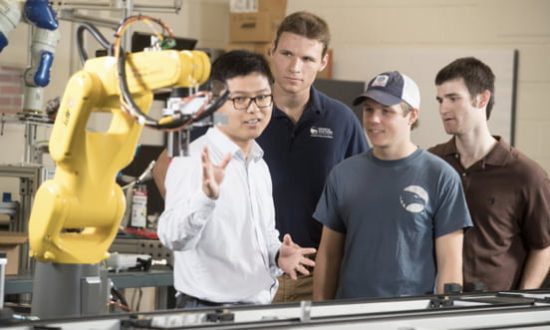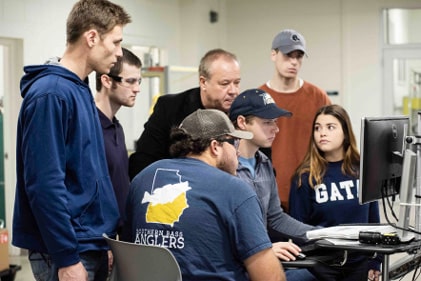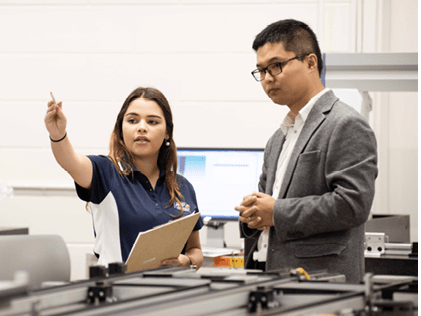Eagles in Demand
First Graduating Manufacturing Engineering Class Rapidly Finds Jobs

Jesse Davis (’19), one of the first graduates from Georgia Southern’s Bachelor of Science in Manufacturing Engineering, didn’t have to wait long to find a job.
“When I woke up the day of graduation, they called me at eight in the morning and told me I had the job,” he said. “So the day I graduated, I had a job offer from Lummus Corporation.”
As rare as it might seem, Davis’ story is not unique among recent program graduates, and it’s easy to see why.
According to the Bureau of Labor Statistics, Manufacturing Engineering (MfgE) is one of the fastest-growing careers today. Employment of manufacturing engineers is expected to grow by 10 percent through 2026 — faster than all other occupations.
Adding to this demand is the fact that Georgia Southern offers one of the few undergraduate programs in the nation, the only one in Georgia and one of only three in the Southeast United States.
“There are only about 20 nationwide. They are scattered around, but the closest for the B.S. MfgE degree are in Virginia and Texas,” said Daniel Cox, Ph.D., professor and founding department chair.
Even though he moved across the country into a tight job market, program graduate Craig Ward (’19) still found an incredible career, and now works with NASA.
“I moved to the D.C. area after I graduated to be with my girlfriend, and didn’t have a job lined up,” said Craig, who works at NASA’s Goddard Space Flight Center in Maryland as a contract engineer for Newton Engineering and Product Development. “D.C. is a very tight market and I didn’t have any contacts there, but in about two months, I had this one and a couple other opportunities. The manufacturing engineering program is so hands-on and very diverse. It covered many different areas of engineering and that’s what people look for.”
True Hands-On Experience

Cameron Crater, Ana Ordonez, (Standing L to R) Jesse Davis, Jacob Lindsey and Craig Ward on programming
the equipment.
Giving students hands-on experience with automated manufacturing technology is one of the selling points for the department, which opened its doors to the first class of students in fall 2015.
The department houses several manufacturing laboratories, which include computer numerical control (CNC) equipment such as milling machines, lathes, wire electrical discharge machining (EDM), 3D composite and metal printers and waterjet cutters. There are also reconfigurable advanced manufacturing laboratories for robotics and automation.
For the students, all of this technology means relevant experience in the workforce.
“A lot of what I learned basically matched the job description,” said Cameron Crater (’19) who started his career at Samsung Electronics in Newberry, South Carolina. “And what I was interested in really matched what my job criteria was, which is process improvement, reducing defects and things like that.”
“The manufacturing engineering program gave me the skills,” said Ana Ordonez (’19) who works for an Atlanta-area plastics manufacturer on the front lines of the COVID-19 pandemic. “Because of the job in the lab I had as a student, I was able to apply what I learned every day. From programming the CNC to using the waterjet, the 3D printers, from computer skills like AutoCAD and SolidWorks. So it gave me a lot of exposure to what I wanted to do and played a big part in why I was hired.”
Experience Valued by Employers

On top of their hands-on training and technology experience, the program also offers robust co-op, apprenticeship and internship programs. Jacob Lindsey (’19) benefited from an apprenticeship program sponsored by JCB and is now employed as an engineer in their Pooler, Georgia, facility.
“I started out in JCB’s apprenticeship program going to classes at Savannah Tech,” he said. “JCB encouraged me to move to Georgia Southern when the MfgE program first started, and it has turned out great for me.”
The department is seeking accreditation from the Accreditation Board for Engineering and Technology, Inc. now that the first cohort of B.S. Manufacturing Engineering students graduated last May. The accreditation will only make the program more desirable to students and to the employers eager to hire them.
“Industry is always asking for more students,” said Cox. “The entire class of 2019 got jobs, with the exception of Ryan Kent who is a teaching and a research assistant as a graduate student here. Some students are getting job offers before they graduate. It’s just an indication that the companies are really after them, there is such a high demand.” — Liz Walker
